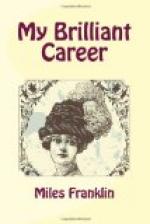Towards the end of February a great shooting and camping party, organized by grannie, was to take place. Aunt Helen, grannie, Frank Hawden, myself, and a number of other ladies and gentlemen, were going to have ten days or a fortnight in tents among the blue hills in the distance, which held many treasures in the shape of lyrebirds, musk, ferns, and such scenery as would make the thing perfection. After this auntie and I were to have our three months’ holiday in Sydney, where, with Everard Grey in the capacity of showman, we were to see everything from Manly to Parramatta, the Cyclorama to the Zoo, the theatres to the churches, the restaurants to the jails, and from Anthony Hordern’s to Paddy’s Market. Who knows what might happen then? Everard had promised to have my talents tested by good judges. Might it not be possible for me to attain one of my ambitions—enter the musical profession? joyful dream! Might I not be able to yet assist Harold in another way than matrimony?
Yes, life was a pleasant thing to me now. I forgot all my wild unattainable ambitions in the little pleasures of everyday life. Such a thing as writing never entered my head. I occasionally dreamt out a little yarn which, had it appeared on paper, would have brimmed over with pleasure and love—in fact, have been redolent of life as I found it. It was nice to live in comfort, and among ladies and gentlemen—people who knew how to conduct themselves properly, and who paid one every attention without a bit of fear of being twitted with “laying the jam on”.
I ate another fig and apricot, a mulberry or two, and was interrupted in the perusal of my book by the clatter of galloping hoofs approaching along the road. I climbed on to the fence to see who it could be who was coming at such a breakneck pace. He pulled the rein opposite me, and I recognized a man from Dogtrap. He was in his shirt-sleeves; his horse was all in a lather, and its scarlet nostrils were wide open, and its sides heaving rapidly.
“I say, miss, hunt up the men quickly, will you?” he said hurriedly. “There’s a tremenjous fire on Wyambeet, and we’re short-handed. I’m goin’ on to knock them up at Bimbalong.”
“Hold hard,” I replied. “We haven’t a man on the place, only Joe Slocombe, and I heard him say he would ride down the river and see what the smoke was about; so he will be there. Mr Hawden and the others have gone out for the day. You go back to the fire at once; I’ll rouse them up at Birribalong.”
“Right you are, miss. Here’s a couple of letters. My old moke flung a shoe and went dead lame at Dogtrap; an’ wile I was saddlun another, Mrs Butler stuffed ’em in me pocket.”
He tossed them over the fence, and, wheeling his mount, galloped the way he had come. The letters fell, address upwards, on the ground—one to myself and one to grannie, both in my mother’s handwriting. I left them where they lay. The main substance of mother’s letters to me was a hope that I was a better girl to my grannie than I had been to her—a sentiment which did not interest me.




